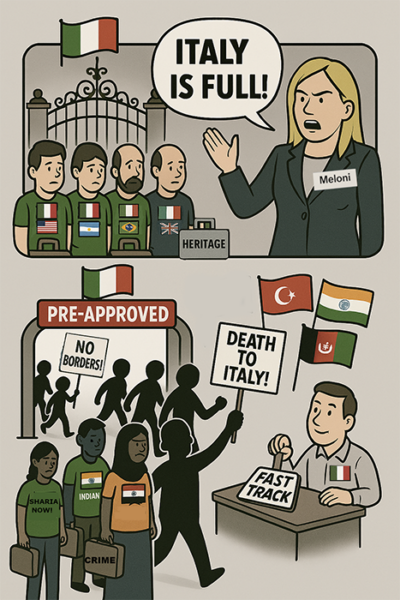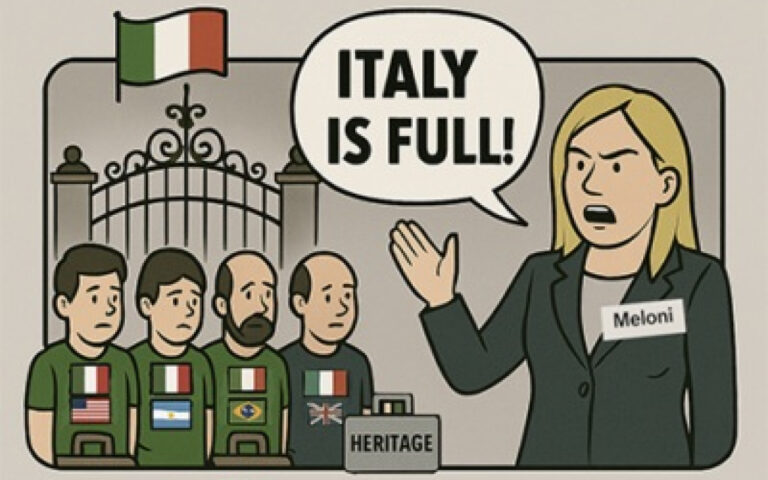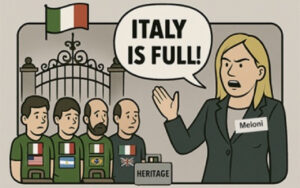In 2022, Giorgia Meloni swept into power promising to defend Italy’s people, cultural identity, and borders. Millions of Italians worldwide saw her as a savior — someone finally committed to putting Italy first after decades of unchecked migration and political cowardice. But as time passes, the mask is slipping.
I am among the millions with Italian ancestry — those deeply tied to the country through blood, culture, and family history. Our ancestors were Italian. We are Italian. We were given Italian names, grew up celebrating Italian holidays, cooking Italian food, and taking part in Italian traditions. Many of us would love to return to Italy via the jure sanguinis (rite of blood) process that, until recently, has been fairly accessible. To be clear, we don’t want to come as strangers — we want to return as family. Yet now we’re told: Italy is full. Under Giorgia Meloni, Italy has changed the rules to make it impossible for millions of loyal sons and daughters to come home as citizens.
I applied before the change. All I needed were birth, marriage, and death certificates for my grandfather, father, and myself, as well as my grandfather’s American naturalization records from here in the US. I tracked down all the documents myself, but I had to pay fees for them to be certified and legally translated. I filled out two straightforward forms and paid a €600 filing fee. The biggest headache was getting a consulate appointment. They often show as fully booked, and have to be made more than a year in advance. I did it all myself, but most people hire a lawyer for several thousand dollars. The process takes two to three years, give or take.
Now, it’s not just bureaucratic inconvenience, though there is plenty of that. While the government drags its feet on ancestral claims, imposing absurd delays, it actively accelerates immigration from countries with no historical, cultural, or spiritual ties to Italy. Legal entry for non-Europeans has never been easier. Over the past few years, Miss Meloni’s government expanded quotas for seasonal workers and created pathways to regularize illegals already in Italy. NGOs and pro-migration associations have praised these moves, citing a growing number of “humanitarian” and “economic necessity” visas.
Thousands of migrants from Africa, the Middle East, and South Asia continue to arrive each month — many illegally, many unwilling or unable to assimilate, and some openly hostile to Italy. These illegal inflows often go unchecked, as the state focuses more energy on accommodating newcomers than on enforcing the law or preserving national cohesion.
Worse may be coming. A June referendum could slash the residency requirement for citizenship from 10 years to just 5 for non-Europeans. Someone with no connection to Italy — no lineage, no shared tradition — could become an Italian citizen faster than ever, while those with deep familial ties face mounting restrictions.
But the greatest betrayal to diaspora Italians was a March 28, 2025, legislative decree capping jure sanguinis eligibility at two generations. Only those with an Italian-born parent or grandparent — the rules under which I was accepted — may now apply. Great-grandchildren and beyond, regardless of their cultural identity or love for Italy, are excluded. It’s an unprecedented restriction on a right that existed for over a century. It sends a chilling message: your connection to Italy no longer matters.
This was not the first blow to the diaspora. In October 2024, a court ruling known as the “minor issue” decision determined that if an Italian ancestor had naturalized in another country while his child was still a minor, that child — and therefore all their descendants — lost any claim to Italian citizenship. This interpretation retroactively disqualified thousands of families previously considered eligible.
Families that had carefully collected documents, traced their lineage, and dreamed of reuniting with their ancestral homeland suddenly found themselves erased from Italy’s future. My own relatives — siblings, cousins — were among them. For example, my sister was made ineligible due to the “minor issue” ruling, whereas my first cousin was made ineligible due to the new “two generation cap.” Just six months ago, they were both perfectly eligible.
These decisions don’t exist in a vacuum. They arrive just as the government opens the door wider to those with no connection to Italy, who are invited to claim Italian identity by mere presence. If Italy truly were full, then that fullness would apply universally. A nation cannot have it both ways. If there’s no room at the inn, that applies to everyone, not just to those who carry Italy in their blood.

This isn’t immigration policy; it’s national suicide.
The Italian birth rate has collapsed to just 1.2 children per woman — one of the lowest in the world. Entire villages are empty. The social fabric frays. And instead of turning to the diaspora — the millions who love Italy, who want to move there, invest there, raise families there — the government imports migrants who often need massive social support and contribute little to national cohesion.
Towns that could be revitalized by Italian families are beginning to crumble or be repopulated by people with no shared memory and no loyalty to the land. Schools will face language gaps and cultural tensions. Crime will rise. Cultural identity will continue to fade. And through it all, silence. No vision. No plan. No serious attempt to leverage the strength of the Italian diaspora.
To be Italian is not just to speak the language or enjoy the food. Culture can be imitated, even programmed. A robot could be taught to cook regional dishes or recite Dante — but that would not make it Italian. The soul of a nation is in the blood of the people who created it — those who see it as uniquely their own.
Miss Meloni’s government had every reason to say: Italy is more than geography or rituals — it is a people, and a people that extends far beyond the Alps and the Mediterranean. She could have embraced the diaspora, cut red tape, and prioritized return over replacement. Instead, she chose the opposite.
Italy’s emigrants are its best hope. We don’t want handouts — we want to rebuild. We want to revitalize the homeland of our ancestors, protect its traditions, and raise families who speak its language and live its values.
Italy cannot survive as a museum — full of ruins and recipes but emptied of the lineage of the people who made them. Set on this path, the future awaiting Italy is not a rebirth — but a burial.
History will not remember slogans. It will remember choices. And if the gates of Italy continue to close on its own children, history will not remember Meloni as a patriot.
It will remember her as the leader who told Italians: Stay out.
This article originally appeared on American Renaissance and is republished by The Noticer with permission.





















